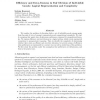Free Online Productivity Tools
i2Speak
i2Symbol
i2OCR
iTex2Img
iWeb2Print
iWeb2Shot
i2Type
iPdf2Split
iPdf2Merge
i2Bopomofo
i2Arabic
i2Style
i2Image
i2PDF
iLatex2Rtf
Sci2ools
114
click to vote
JAIR
2008
2008
Efficiency and Envy-freeness in Fair Division of Indivisible Goods: Logical Representation and Complexity
We consider the problem of allocating fairly a set of indivisible goods among agents from the point of view of compact representation and computational complexity. We start by assuming that agents have dichotomous preferences expressed by propositional formulae. We express efficiency and envy-freeness in a logical setting, which reveals unexpected connections to nonmonotonic reasoning. Then we identify the complexity of determining whether there exists an efficient and envy-free allocation, for several notions of efficiency, when preferences are represented in a succinct way (as well as restrictions of this problem). We first study the problem under the assumption that preferences are dichotomous, and then in the general case.
| Added | 12 Dec 2010 |
| Updated | 12 Dec 2010 |
| Type | Journal |
| Year | 2008 |
| Where | JAIR |
| Authors | Sylvain Bouveret, Jérôme Lang |
Comments (0)

